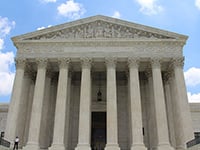| In this issue, we highlight this week's Supreme Court decision that eliminates a significant source of consumer class litigation against many consumer financial services companies; and we discuss payment compliance 101 for VARs, ISVs, gateways, and payment facilitators. You will also find coverage from COMPLY2017, and information on the upcoming ACA International 2017 Convention and Expo. | |
 |
Supreme Court Rejects FDCPA Coverage of Debt Buyers, Settling Circuit Split Companies that purchase and service default accounts for their own account are not considered "debt collectors" under the FDCPA, the U.S. Supreme Court ruled on June 12. This decision eliminates a significant source of consumer class litigation against many consumer financial services companies. |
 |
Payments Compliance 101 for VARs, Gateways, and ISVs The payments industry evolves almost daily with the introduction of new technologies and shifting consumer preferences. While in the past there was a well-understood hierarchy of service providers, such as banks, processors, and ISOs, a new breed of technology companies, including VARs, ISVs, gateways, and payment facilitators, are increasingly building payments technologies into their software platforms to compete more directly with traditional payments companies. |
 |
What to Expect in a Narrowed CFPB Debt Collection Rulemaking The CFPB announced a new direction for debt collection rulemaking. A first debt collection rulemaking will only focus on consumer disclosures and communications by third-party collectors, and will not address data and documentation needed to substantiate debt as originally anticipated. |
 |
The CFPB Is Still Playing Sheriff As the Court of Appeals for the D.C. Circuit hears the Consumer Financial Protection Bureau's (CFPB or Bureau) en banc appeal of the PHH case, many are unsure of the current state of the CFPB's authority. Despite an initial decision that the CFPB's structure is unconstitutional, the agency continues to issue and obtain judicial enforcement of its Civil Investigative Demands (CIDs). Companies that have received a CID should take notice that the Bureau is still issuing CIDs and seeking to enforce them. |
| PREVIOUS EVENT | |
 |
At COMPLY2017, Alexandra Megaris, Counsel, led a discussion on "The Shifting Regulatory Environment" with Joy Feigenbaum (Executive Deputy Superintendent for Financial Frauds and Consumer Protection, New York State Department of Financial Services); Brian Lasky (Federal Trade Commission); Jane Azia (Bureau Chief, Bureau of Consumer Frauds and Protection, Office of the New York State Attorney General); and Martha Coakley (former Massachusetts Attorney General) on June 7, 2017 in NYC. Panelists discussed the post-2016 election consumer protection federal and state regulatory and enforcement environment, including trends, tips to stay out of trouble, and how to manage investigations. COMPLY2017, presented by PerformLine, brought together C-suite compliance/marketing/legal executives, from high-profile companies, who are interested in compliance and new technologies. Jonathan Pompan also attended the conference. |
| UPCOMING EVENT | |
| July 17, 2017: Regulatory Compliance in an Evolving Legal Landscape at the ACA International 2017 Convention and Expo | |
| IN THE NEWS | |
|
Law360 quotes Jonathan Pompan on CFPB move to update debt collectors' communications and disclosure rules. |
|